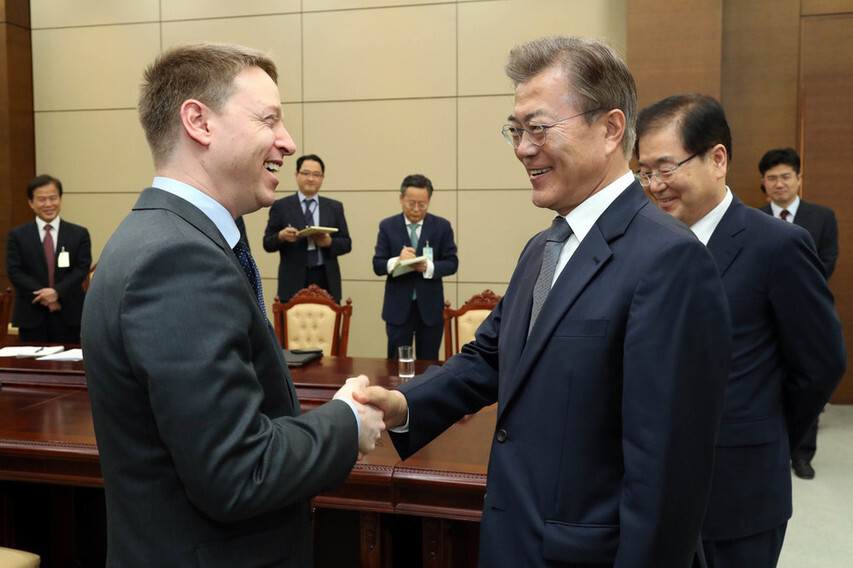hankyoreh
Links to other country sites 다른 나라 사이트 링크
[Editorial] Can the South Korea-US summit lead to a breakthrough on North Korea?

South Korea and the US agreed to hold their first summit since the inauguration of President Moon Jae-in, in Washington, DC, at the end of next month. Given the urgent developments on the Korean Peninsula, including North Korea’s missile launches and the deployment of the THAAD missile defense system, the two new administrations’ agreement to hold a summit so soon is welcome news. South Korea had to do without summit diplomacy for six months because of the Choi Sun-sil scandal and the impeachment of former president Park Geun-hye. This inspired the term “Korea passing,” a reference to how South Korea was being disregarded by its neighbors. By holding summits, first with the US and then with China and Japan, the Moon administration seems set to tackle pending diplomacy and security issues.
During a meeting on May 16 between Chung Eui-yong, head of the Blue House diplomacy and foreign affairs task force, and Matthew Pottinger, senior director for East Asia at the White House’s National Security Council, the two sides reportedly affirmed their agreement on several points: that completely dismantling North Korea’s nuclear program is the ultimate goal; that all measures, including sanctions and dialogue, will be mobilized; and that dialogue is possible with North Korea when the right conditions are in place. While these remarks seem to emphasize sanctions, they also indicate a willingness to open the door to dialogue. In that sense, we hope that the US-South Korea summit will result in a breakthrough on the North Korean nuclear issue. In order to adequately prepare for the summit, the South Korean government should hurry to complete its new foreign affairs and security appointments.
The THAAD deployment is another point of contention that needs to be discussed during the summit. While Pottinger said that dialogue will continue on the issue, he declared that the issue had already been decided. This hints at the difficulty of the deliberations that will be held with the US on the issue. A public opinion poll carried out by Korea Research, commissioned by the Hankyoreh, between May 12 and 13 showed that 56.1% of South Koreans think that the THAAD deployment decision ought to be reconsidered. This indicates that public expectations for a review of the THAAD deployment have increased since Moon’s inauguration as president. The new government cannot avoid the task of reconciling conflicting interests, including public wishes, American obstinacy and Chinese expectations. Regardless of the circumstances, the government must respond with courage and clarity to unreasonable requests such as for South Korea to cover the US$1 billion cost of THAAD.
During a meeting with the special envoys who are being dispatched to the US, China, Japan and Russia, Moon asked the envoys to “emphasize [to each country] that political legitimacy and transparency have become extremely important.” Moon was making clear that this government (unlike the previous one) was established in the wake of a people’s revolution. As Moon said, it’s important for even security and foreign policy issues to be addressed through transparent procedures and with the attitude that the public should be involved in their resolution.
Please direct questions or comments to [english@hani.co.kr]

Editorial・opinion
![[Column] Has Korea, too, crossed the Rubicon on China? [Column] Has Korea, too, crossed the Rubicon on China?](https://flexible.img.hani.co.kr/flexible/normal/500/300/imgdb/original/2024/0419/9317135153409185.jpg) [Column] Has Korea, too, crossed the Rubicon on China?
[Column] Has Korea, too, crossed the Rubicon on China?![[Correspondent’s column] In Japan’s alliance with US, echoes of its past alliances with UK [Correspondent’s column] In Japan’s alliance with US, echoes of its past alliances with UK](https://flexible.img.hani.co.kr/flexible/normal/500/300/imgdb/original/2024/0419/2317135166563519.jpg) [Correspondent’s column] In Japan’s alliance with US, echoes of its past alliances with UK
[Correspondent’s column] In Japan’s alliance with US, echoes of its past alliances with UK- [Editorial] Does Yoon think the Korean public is wrong?
- [Editorial] As it bolsters its alliance with US, Japan must be accountable for past
- [Guest essay] Amending the Constitution is Yoon’s key to leaving office in public’s good graces
- [Editorial] 10 years on, lessons of Sewol tragedy must never be forgotten
- [Column] A death blow to Korea’s prosecutor politics
- [Correspondent’s column] The US and the end of Japanese pacifism
- [Guest essay] How Korea turned its trainee doctors into monsters
- [Guest essay] As someone who helped forge Seoul-Moscow ties, their status today troubles me
Most viewed articles
- 1[Column] The clock is ticking for Korea’s first lady
- 2[Column] Has Korea, too, crossed the Rubicon on China?
- 3After 2 months of delayed, denied medical care, Koreans worry worst may be yet to come
- 4US overtakes China as Korea’s top export market, prompting trade sanction jitters
- 5[Editorial] When the choice is kids or career, Korea will never overcome birth rate woes
- 6[Correspondent’s column] In Japan’s alliance with US, echoes of its past alliances with UK
- 7Hong Se-hwa, voice for tolerance whose memoir of exile touched a chord, dies at 76
- 8Nearly 1 in 5 N. Korean defectors say they regret coming to S. Korea
- 9John Linton, descendant of US missionaries and naturalized Korean citizen, to lead PPP’s reform effo
- 10Strong dollar isn’t all that’s pushing won exchange rate into to 1,400 range